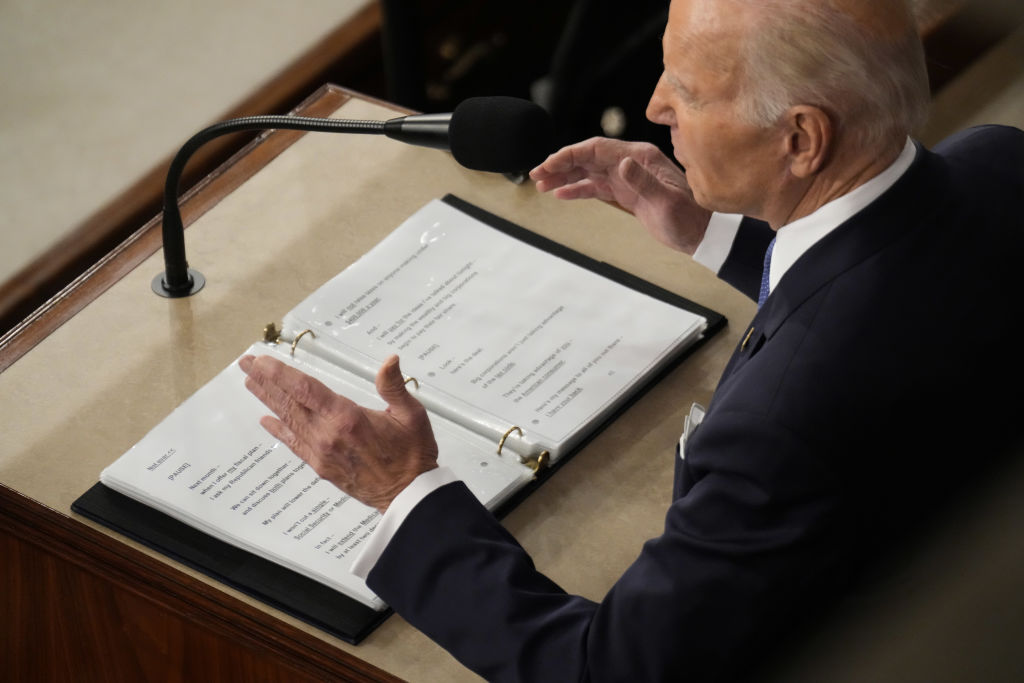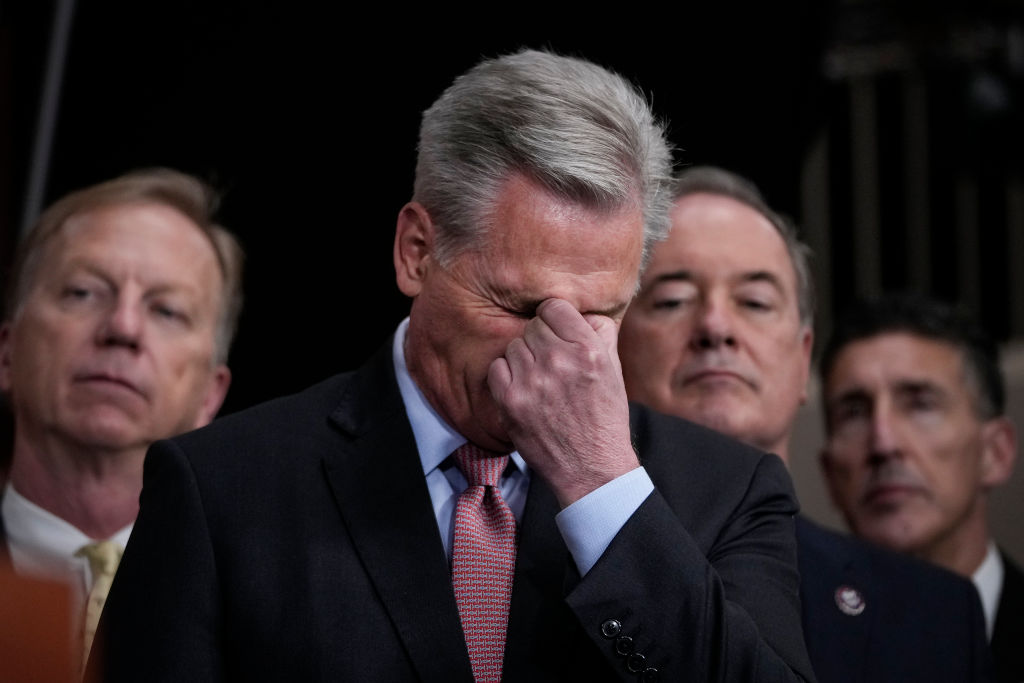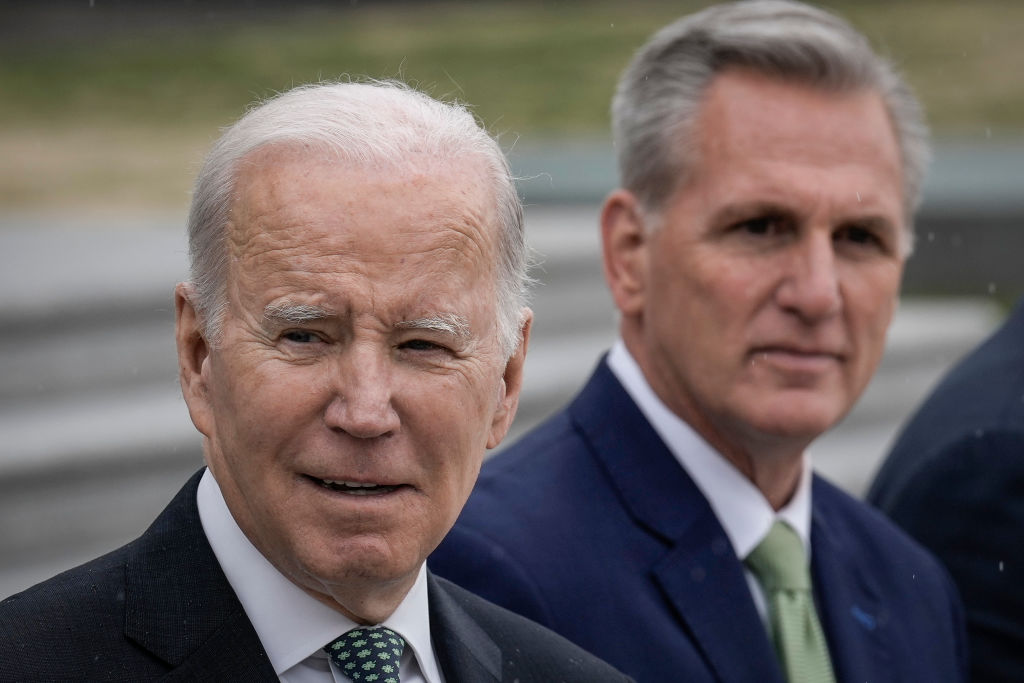With just a week to go before a possible default on the nation’s spiraling debt, President Joe Biden and House Speaker Kevin McCarthy (R-CA) once again failed to come to a compromise. Displaying all the drama of a “will they, won’t they” 80s romcom, the two leaders appear determined not to be the one who gives in first. For both men, what remains is a series of public gambits to deflect fault and retain a semblance of authority.
A Progressive Progress?
Monday, May 22, the leaders announced that their latest session had yielded no results, and yet talk of elusive – and perhaps illusory – progress abounded. Biden released a short statement that implied forward movement without committing to any actual headway. “I just concluded a productive meeting with Speaker McCarthy about the need to prevent default and avoid a catastrophe for our economy. We reiterated once again that default is off the table and the only way to move forward is in good faith toward a bipartisan agreement.” The missive concluded, “While there are areas of disagreement, the Speaker and I, and his lead negotiators Chairman McHenry and Congressman Graves, and our staffs will continue to discuss the path forward.”
McCarthy was also understated in his summation to reporters after the meeting. He said, “I felt we had a productive discussion… We don’t have an agreement yet, but I did feel the discussion was productive in areas that we have differences of opinion.”
So with no actual progress, what options do Biden and McCarthy have in their political arsenal?
 Biden Blows the 14th Amendment Gambit
Biden Blows the 14th Amendment Gambit
There has been much chatter in Democrat circles of invoking the 14th Amendment; a position enforced by Biden’s own words at the recent G7 meeting in Japan. When asked whether he would consider using it to get around the GOP objections, he said, “I think we have the authority…. The question is: Could it be done and invoked in time that it could not—would not be appealed and, as a consequence, pass the date in question and still default on the debt. That’s a question that I think is unresolved.”
In one – surprisingly well-crafted – sentence, Biden brushed aside constitutional concerns and made the case that the presidential use of such a power was, indeed within his remit. However, the relevant language in Section 4 of the 14th Amendment reads:
“The validity of the public debt of the United States, authorized by law, including debts incurred for payment of pensions and bounties for services in suppressing insurrection or rebellion, shall not be questioned. But neither the United States nor any State shall assume or pay any debt or obligation incurred in aid of insurrection or rebellion against the United States, or any claim for the loss or emancipation of any slave; but all such debts, obligations and claims shall be held illegal and void.”
A number of scholars, legal experts, and even left-leaning media outlets have disputed that the Amendment says anything at all about allowing a president to raise the debt limit.

(Kent Nishimura / Los Angeles Times via Getty Images)
Coming from the sidelines is Sen. Bernie Sanders (I-VT) who along with nine Democrat senators submitted a letter to the administration “to urgently request that you prepare to exercise your authority under the 14th Amendment of the Constitution.” The Vermont socialist is suggesting that Biden already has the power to expand the debt; a view that would entail the Executive having the right to borrow and spend money as it sees fit. However, these are powers that the Constitution grants solely to Congress.
As lawyer Jonathan Turley points out this would be the very thing Founding Father George Mason warned of: “no branch of government should ever be able to combine the power of the sword with the power of the purse.”
Indeed, Liberty Nation’s Legal Affairs Editor Scott D. Cosenza offered a similar rebuttal, saying, “Using the 14th Amendment to justify a novel spending authority for the president certainly is interesting. However, it’s antithetical to those who prefer attributing plain meaning to words. The Constitution says, ‘Congress shall have Power To lay and collect Taxes, Duties, Imposts, and Excises, to pay the Debts … of the United States’ and that ‘No Money shall be drawn from the Treasury, but in Consequence of Appropriations made by Law.’ It’s hard to understand how that power could also rest with the president simply because of a line that says the public debt ‘shall not be questioned.’ Expanding the role of the president so broadly would seem to require a more direct statement in the Amendment.”
Joe Biden is left in the unenviable position of hoping that McCarthy will eventually cave to pressure.
McCarthy’s Damoclean Dilemma
For McCarthy, this is a significant test of his leadership – and one that he can ill afford to fail. When he secured the speakership, the price to pay was to allow a “motion to vacate” which means any single GOP member can call for a vote of no confidence. Presently, the speaker has the appearance of a man in control, but should he fold to Biden’s demands, it could cost him more than short-term political embarrassment.

(Photo by Drew Angerer/Getty Images)
It is no secret that the House GOP is looking to win a big score over the Biden administration, and a victory in the debt ceiling argument would send a powerful message to both Republican voters and a House caucus that McCarthy is in control. But is he?
McCarthy has not just the Democrat opposition to deal with but also the mirror of public opinion. Left-leaning news outlets are coalescing around the idea that if the US defaults and a fiscal disaster ensues, the fault will rest only with the GOP leader.
A Spending Cap Compromise?
A possible outcome is a rehash of the 2011 negotiations under former President Barack Obama. However, that deal came down to the wire (just 72 hours before default) and hinged on spending caps – an agreement to limit spending in the next round for concessions on the package at hand. While the similarities are strong, Neil Bradley – an aide to former House Majority Leader Rep. Eric Cantor (R-VA) – who was intimately involved in the arbitration – does not seem hopeful for a Biden/McCarthy agreement.
“I’m much more scared now… Negotiations in 2011 went right up to the 11th hour (but) it was very clear that both sides understood that default is not an option… Everyone was at the table” back then, Bradley said.
It is becoming increasingly clear that both McCarthy and Biden need to be seen as the winner in the debt limit battle; the former to retain his position in the House and the latter to rally his party for the 2024 presidential election. When it comes to DC dealings, they know that a little give and take can often result in a happy compromise, but when egos are on the line, all bets are off.




